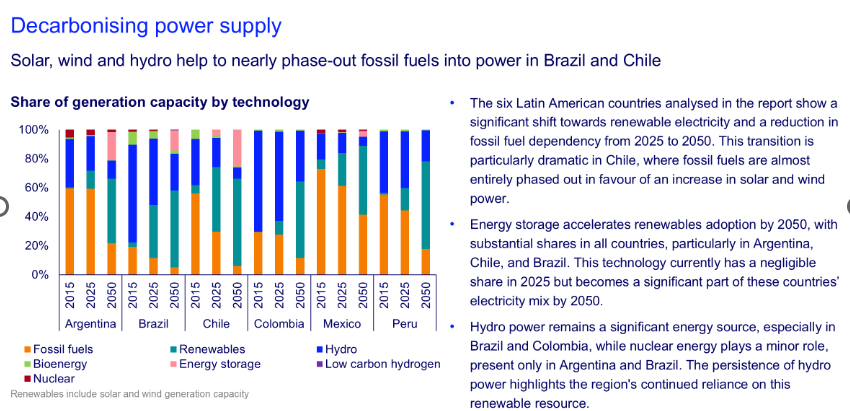
Latin America's Top Economies Raise the Game in Renewable Power
Published by Todd Bush on July 10, 2025
Nearly 70% of electricity comes from renewables, which is about 60% more than the global average
According to the “Benchmarking Latin America energy markets” report from Wood Mackenzie, Latin America is making progress in reducing its carbon emissions and adopting more sustainable energy sources. However, it still has a long way to go to meet global climate goals.
The analysis focuses on the six largest economies in the region by GDP that have more noticeable advances in this field: Brazil, Mexico, Argentina, Colombia, Chile and Peru. Gerado Bocard, research analyst at Wood Mackenzie, said, “These countries share broad structural similarities: reliance on fossil fuels and minerals exports, increasing urbanisation, and growing energy demand.”
>> In Other News: RNG Coalition welcomes One Big Beautiful Act
Fossil fuels: Where there’s room to grow
Fossil fuels remain an important source of energy; however, the selected countries have been working on reducing their dependence on them. Brazil is leading this commitment, and it’s expected to drop its use to 49% by 2050; Mexico remains heavily reliant on fossil fuels with its share declining modestly from 95% to 86% by 2050.
Renewable energy sources bring high expectations
Chile has made significant progress in renewable energy sources, which accounted for 70% of its electricity by the end of 2024; positioning it as a leader in clean energy adoption across Latin America. Some countries, such as Brazil and Colombia, have expanded the use of hydro power, while nuclear energy plays a minor role, present only in Mexico, Argentina and Brazil. Across the region, solar, wind, and biofuels are seeing a significant increase, harnessing rich natural resources.

The promise of green hydrogen and CCUS
Across the region there are 167 low-carbon hydrogen, and 58 carbon capture, utilisation and storage (CCUS) projects announced. Brazil is leading with 43 projects, including 24 Mt CCUS capacity in operation and 11.5 Mt under development. Latin America is experiencing a surge in green hydrogen initiatives at different phases of progress. Currently, 82 projects are actively running, predominantly in Chile, Brazil, and Argentina. Additionally, numerous other projects have been declared and are at various stages of advancement throughout the region.
These developments highlight the diverse approaches taken by different countries in the region. Bocard commented, “We can see how some of these countries obtain benefits from larger domestic markets while others rely on external influences such as import and export for different commodities.” He added, “However, despite the progress, there's still work to be done to have a sustainable and resilient energy future, collaborative efforts, targeted policies and investments will be crucial in achieving net-zero goals.”
Subscribe to the newsletter
Daily decarbonization data and news delivered to your inbox
Follow the money flow of climate, technology, and energy investments to uncover new opportunities and jobs.
Latest issues
-
Inside America’s Carbon Capture Reality Check
Inside This Issue ⚡ Duke Energy Florida Goes Live With First 100% Hydrogen System ✈️ Air bp Signs Agreement With Airbus on Flight Services and Fuel Supplies in Europe 🌊 Pairing Reefs and Mangroves...
-
Three Nebraska Plants Prove Ethanol CCS Actually Works
Inside this Issue 🌽 Three Nebraska Plants Prove Ethanol CCS Actually Works ☀️ SunHydrogen and CTF Solar Sign Agreement to Accelerate Hydrogen Panel Manufacturing 🧪 GenH2 Completes Major Milestone:...
-
DOE Doubles Down on $1/kg Clean Hydrogen Goal
Inside This Issue 🎯 Doe Doubles Down on $1/kg Clean Hydrogen Goal 🕳️ Quebec Introduces First Legal Framework for Underground CO2 Storage 🧪 Charbone Announces Its First Hydrogen Supply Hub in the O...
Company Announcements
-
JERA Announces Close of Haynesville Shale Gas Asset in Louisiana
TOKYO and HOUSTON, Feb. 12, 2026 /PRNewswire/ -- JERA Co. Inc., a global energy leader and Japan's largest power generation company, today announced that through its subsidiary JERA Americas Inc., ...
-
Buffalo Biodiesel Inc. (“BBD”), a leading recycler of waste vegetable used cooking oil (WVUCO) and producer of renewable feedstocks, announced that they have officially renewed a Part 364 Waste Tra...
-
Air bp Signs Agreement With Airbus on Flight Services and Fuel Supplies in Europe
Air bp has signed a multi-year contract with Airbus for the supply of conventional aviation fuel, sustainable aviation fuel (SAF), and related services in Germany and Spain. This agreement enables ...
-
BEND, Ore.--Element 1® Corp. (“e1”), an Oregon-based leader in methanol-to-hydrogen generation technology, today announced the signing of a Memorandum of Understanding (MOU) with Aurosi Precision C...